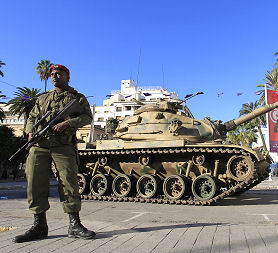Security lockdown after Tunisia violence
Armed soldiers are patrolling the streets of the Tunisian capital after violent protests forced the president to flee the country.

Following two weeks of unrest, Tunisia’s president, Zine al-Abidine Ben Ali fled to Saudi Arabia after the protests reached a climax on Friday.
Prime Minister Mohammed Ghannouchi has taken over as caretaker president, although Tunisia’s Constitutional Council has announced that under the constitution the speaker of parliament should take control not the prime minister. There are fears that the protestors will not accept the rule of Ghannouchi due to his close ties with the president.
“The Constitutional Council announces that the post of president is definitively vacant so we should refer to article 57 of the constitution, which states that the speaker of parliament occupies the post of president temporarily and calls for elections within a period of between 45 and 60 days,” Fathi Abd Ennather, president of the council said on state television.
Violent rioting spread across Tunisia as thousands gathered to protest against high unemployment, high food prices and the president’s leadership. Protestors were killed as they clashed with police, who opened fire in an attempt to quell the violence. Human rights organisations estimate at least 50 protestors have been killed.
A state of emergency was declared which made it illegal for more than three people to congregate in a public place, and a curfew was put in place. The army was called in to stop looters and roaming gangs from attacking people and buildings.
Hundreds of soldiers, backed up by armoured vehicles and tanks have set up manned roadblocks in the capital to restore order. Elsewhere in the city, residents have been protecting their own areas to discourage looters.
Prison deaths
Eyewitnesses told Reuters of a fire at a prison in the resort town of Monastir that has left ‘dozens dead’.
Footage shot by a local man at Monastir hospital shows grim scenes where dozens of bodies were grouped together, seemingly killed by burns and smoke.
Other reports also indicate a mass prison breakout at Mahdia. An eyewitness told Reuters that:
“They tried to escape and the police fired on them. Now there are tens of people dead and everybody has escaped,” said a local man, Imed, who lives 200 metres (yards) from the jail.
‘Restore order’
Prime Minister Ghannouchi promised on live television that everything was being done to restore order.
He said he would meet representatives of political parties on Saturday to attempt to form a coalition government, that it would be a “decisive day”.
“I will meet representatives of political parties to form a government which I hope will meet expectations.”
One of those invited to meet Ghannouchi for coalition talks was Najib Chebbi, an eloquent lawyer who has long been seen by Western diplomats as the most credible figure in the opposition.
“This is a crucial moment. There is a change of regime under way. Now it’s the succession,” Chebbi told France’s I-Tele TV. “It must lead to profound reforms, to reform the law and let the people choose.”
Travel and tourism
Tunisia is a popular holiday destination for tourists, and thousands of foreign tourists have been stranded there by the violence. British tour operators Thomson and First Choice, said they planned to bring back all their remaining 1,400 customers in Tunisia on emergency flights.
Thomas Cook said it had already brought back about 1,500 customers. The remaining 300 were being flown home on an emergency flight on Saturday. They have also cancelled all flights to Tunisia due to depart on Sunday.
Tunisia airspace is now open and civilian flights are able to arrive and depart normally.
“The office for civil aviation and airports states Tunisian airspace and all the airports are open for air traffic, contrary to what has been reported in some media,” the office said in a statement quoted by the official TAP news agency.
The Foreign and Commonwealth is advising against all but essential travel to Tunisia. They recommend that those people still in Tunisia remain indoors if possible and avoid the demonstrations.
British Foreign Office minister Alistair Burt said the next two days would be crucial to Tunisia’s future:
“What we hope to see is Prime Minister Ghannouchi being able to gather significant figures around him to put together a coalition body which will take us through to what we hope will be free and fair elections.”
-
Latest news
-
Yungblud launches his own affordable music festival5m

-
Why these Americans want to quit their state9m

-
Company behind infected water outbreak are ‘incompetent’ says local MP5m

-
Israeli forces push deeper into Northern and Southern Gaza4m

-
India’s ‘YouTube election’: Influencers enlisted to mobilise youth vote6m

-




